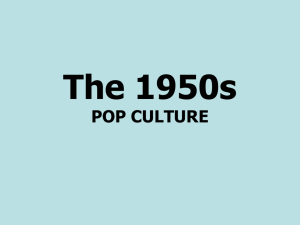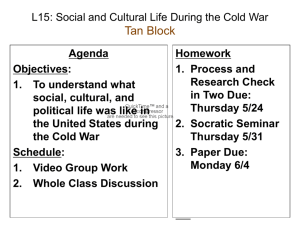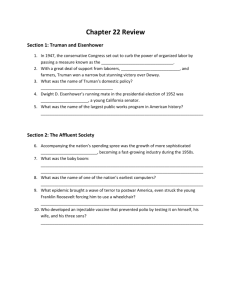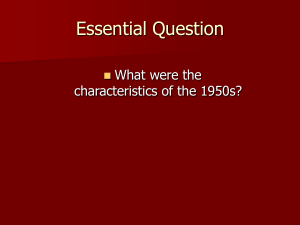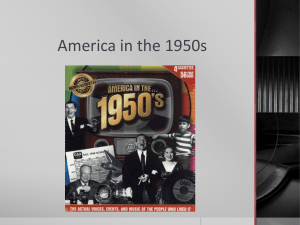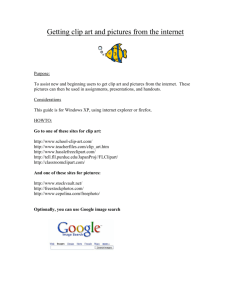The Postwar Era
advertisement
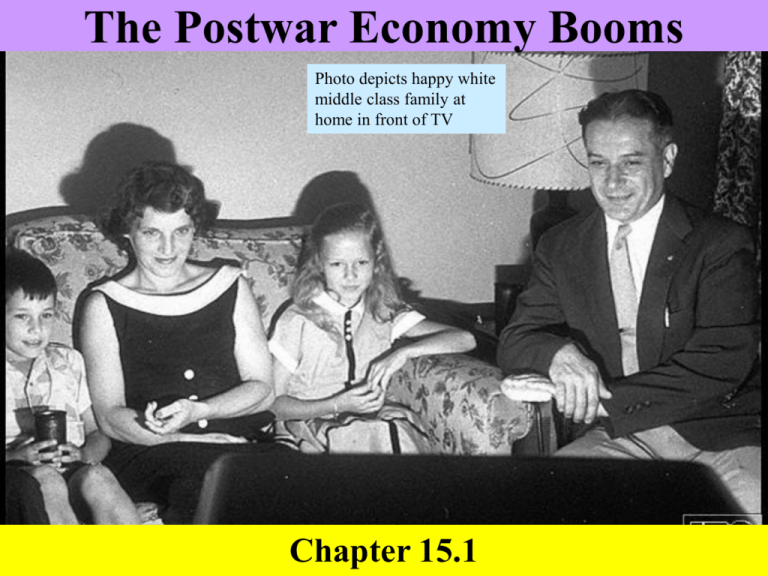
The Postwar Economy Booms Photo depicts happy white middle class family at home in front of TV Chapter 15.1 Suburban dad grilling by swimming pool in backyard with mother and son nearby Using the pictures & the following clips, write five (5) words to describe the American Dream in the 1950s. Capture from clip of Pleasantville More of Peggy Sue and Toby Maguire in Pleasantville How was the American society of the 1950s different from the 1930s? Photo of the extreme baby boom: ten kids, all siblings Capture from start of clip on post-Korea relief and optimism What was the GI Bill of Rights and how did it help returning veterans? • Law which allowed servicemen to attend college with government assistance ($) – Over 8 million did • Whole families boarded in “Veteran Villages” offcampus • Subsidized rents for GI’s too young for houses • Gave vets and families a sense of community • Dance halls, big band shows, bowling • Provided America with a highly trained & educated workforce What are some of the economic indicators of growth during the post WWII years? • Car owners – 2 million sold in 1946 – 8 million sold in 1955 • TVs – 1 million in 1948 – 7.5 million in 1950 • GNP – $100,000,000,000 in 1940 – $300,000,000,000 in 1950 • US made up 6% of world population and produced half the world’s goods! How were wages affected during the 1950s? • Factory Workers – $3,300 in 1950 – $5,300 in 1960 • Real Income = – Income adjusted for inflation (rise in prices) – rose 20%! • Americans had more discretionary income – Money to buy creature comforts (not just necessities) Photos of 1950s era TV and washing machine Consumer Society Capture from clip on the consumer society How did advertising change in the 1950s? • Created new needs and desires through hidden messages – – – – Facial cream= beauty Freezer= plenty car= status symbol mouthwash= popularity • Used the television to shape Americans minds and make them status conscious Above: woman poses with ad for TVs; below: kid’s folks bought him a Superman t-shirt Capture from clip on our ‘love affair with TV’ TV Another capture from a clip on television Describe Corporate America in the 1950s: • Encouraged conformity • White collar-workers (office) were told: – How to dress – Which country club to belong to – Points of view (political) • Important positions filled with white males • Women filled secretarial positions • Minorities shut out DVD cover: “The Man in the Gray Flannel Suit” Capture from clip on the new white-collar careers for men clip How did one’s occupation change in the 1950s? • America started to become a PostIndustrial Service centered economy • Started to go from factory to white collar (office) jobs Chart shows decline in farm population as people did other things for a living How did the automobile affect American society in the 1950s? • National Highway Act 1956 – 40,000 miles of federal highways • 58 million cars sold in the 1950s! • Drive-in economy, food, entertainment • People commuted greater distances to work. • Suburbs grew – Farmland sold for development – Urban flight Above: interstate clover leaf; middle: • Gas drive-in movie; below: consumption increased suburbia Cars Capture from another clip on cars
